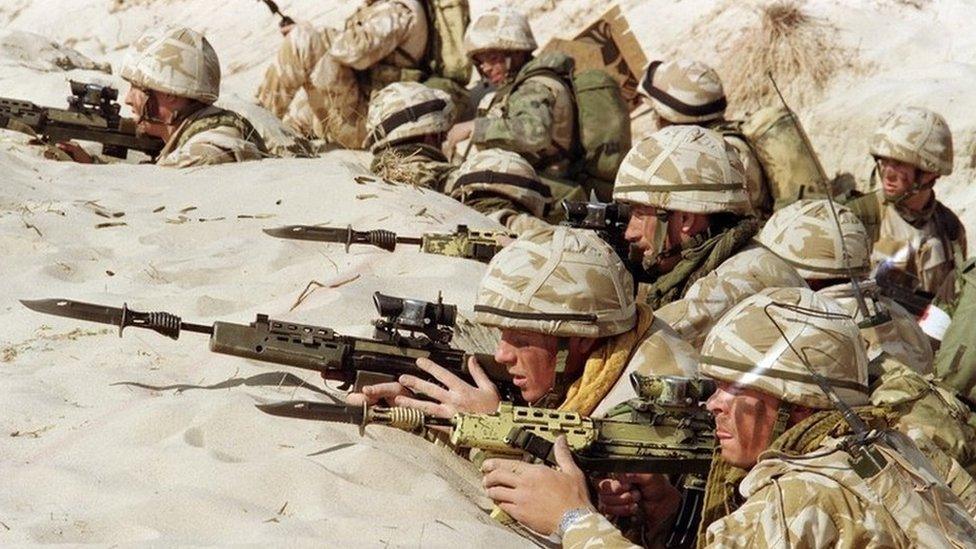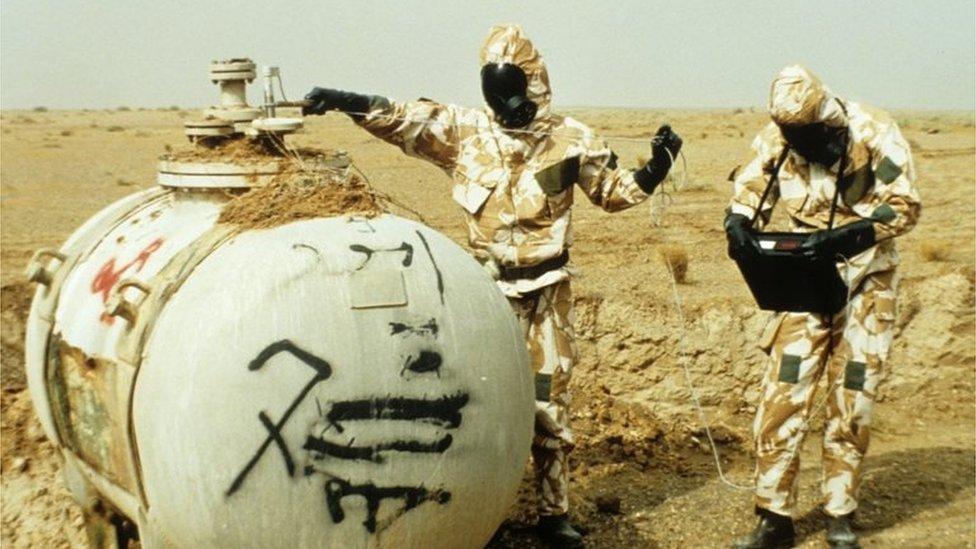British Legion calls for more research into Gulf War illnesses
- Published

More help is needed for veterans with Gulf War Syndrome, the Royal British Legion has said, as it marks 25 years since the beginning of that conflict.
Over 33,000 former soldiers are thought to suffer from illnesses related to their service such as chronic headaches, fatigue and memory problems.
The charity said too little was known about the condition and the government should fund more research into it.
The Ministry of Defence said it was always open to new research proposals.
Reported symptoms of Gulf War Syndrome range from chronic fatigue, headaches and sleep disturbances to joint pains, irritable bowel, stomach and respiratory disorders and psychological problems.
But the MoD says "the overwhelming consensus of the scientific and medical community" is that the range of symptoms is too broad "for this ill health to be characterised as a syndrome in medical terms".
'Important area'
In 1991 more than 50,000 members of the British armed forces were deployed in the Persian Gulf as part of Operation Desert Storm - a US-led campaign against the Iraqi invasion of Kuwait.
The British Legion, external - which provides support for veterans - said more than 60% were now suffering from illnesses related to the conflict, with nearly 10,000 receiving a war pension, the financial aid any ex-service personnel with an illness due to service can receive.
Marie Louise Sharp, policy adviser at the Legion, said that 25 years on, more needed to be done to help ill soldiers.
"We know the health of ill Gulf War veterans continues to be an important area for the government, which is why the Legion is calling for investment into research so we can understand how to improve the lives of those affected," she said.
"In addition, we ask for formal communication channels to be established to convey the results of US research developments to Gulf War veterans living here in the UK."

Gulf War Syndrome

Broad term for a wide range of symptoms reported by veterans, including chronic fatigue, sleep disturbances, joint pain and respiratory disorders
A 2005 tribunal ruled that Gulf War Syndrome does not exist as a discrete pathological entity, but decided it should be used as an umbrella term for conditions which are accepted as due to service
Suggested causes include vaccinations, depleted uranium from armour-piercing weapons, nerve agents and toxic smoke from burning oil wells
The MoD says it has "always accepted" that some veterans have become ill "and that this ill health may be related to their Gulf experience", but successive governments have resisted calls for a public inquiry into the phenomenon
Veterans suffering illness due to service receive support through the War Pensions Scheme

The charity said research into appropriate treatment and health pathways would significantly improve their lives but that there had never been any published research in the UK into treatment or best practice.
There is still disagreement over why rates of ill health are twice as high among Gulf War veterans than troops deployed elsewhere, and campaigners and doctors continue to disagree over whether the syndrome actually exists as a medical condition unique to Operation Desert Storm.
In its 2015 manifesto, external the Legion said the first phase of an MoD-commissioned study at Cardiff University, which examined potential interventions to rehabilitate ill Gulf War veterans, had started in January 2009 but "for reasons unknown to us, the MoD chose not to fund the second phase of research, and the results of phase one were never published".
The MoD said it was always open to new research proposals, but added that the war pension scheme was part of its absolute commitment to the armed forces.
- Published16 January 2011
- Published3 May 2014

- Published2 January 2016

- Published17 January 2016
